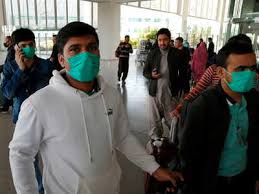Pakistani, other foreign students praise support in Wuhan

Beijing: Pakistani and other international students in Wuhan, Hubei province of China said that they have been receiving good care during the novel coronavirus outbreak thanks to arrangements made by their universities and local authorities.
Hassan Ali, 21, a Pakistani studying logistics engineering at Wuhan Textile University, said that he was unsettled at the start of the outbreak and his family was also worried about his safety.
“My teachers supported us a lot, helping us each and every moment,” said Ali, who began his studies in September, China Daily reported.
“They raised awareness of the disease, arranged food for us and provided us with masks and all necessary things in our dormitory.”
Ali eventually became more at ease about the situation and told his parents, who had contacted him often every day, not to worry.
“I consider Wuhan my second home, and I’m safe and sound,” he said. “Now I’m not worried about the outbreak of coronavirus because I trust the Chinese government will prevail over the epidemic.”
Odongo Odol Richard, 34, a Kenyan student at Wuhan Textile University pursuing a master’s degree in software engineering, said that during the outbreak he was deeply impressed by “the resilience, patience and care demonstrated by Chinese people toward each other and toward foreigners”.
As the outbreak began, Richard was hospitalized due to severe inflammation of his pancreas, which led to him staying in Renmin Hospital of Wuhan University for 52 days. He was discharged on March 6 and placed under 14-day quarantine at his university.
After his admission to the hospital, shortly before the outbreak, his teachers and classmates were with him every step of the way because of his serious health condition, Richard said.
Shortly afterward, the city’s lockdown prevented their frequent visits to Richard’s ward although they maintained communication through social media.
“University officials and teachers were also in communication with my hospital, my family, the embassy in Beijing, my insurer and Rongo University in Kenya, which sponsored me to come to China,” he said. “I have been receiving a lot of attention and care from different quarters and am truly grateful for all the kindness.”
Richard received periodic updates about the outbreak from a TV in his ward and was moved by the unity of the Chinese people in the fight against the virus.
“I first witnessed human traits in hospital when family members of my fellow patients offered me assistance when they noticed I was incapacitated due to my illness,” he said. “It is a characteristic that seemed embodied by most Chinese nationals I met.”
Many international students studying at universities in Wuhan were evacuated to their own countries after the contagion caused panic in the hardest-hit city.
No official statistics are available on the number of foreign students remaining in Wuhan, but one estimate puts them at over 1,000.
Ibrahim Sangare, 23, from Cote d’Ivoire, studies business administration at South-Central University for Nationalities. Sangare said he has told his family about how the Chinese government and people have protected him and his classmates, so they are comfortable with his safety in China.
“The university, the Chinese government they do their best to protect us,” Sangare said.
The measures that the Chinese government have taken to protect its people and foreign nationals living in China are impressive, as are the sacrifices of Wuhan residents, he added.





